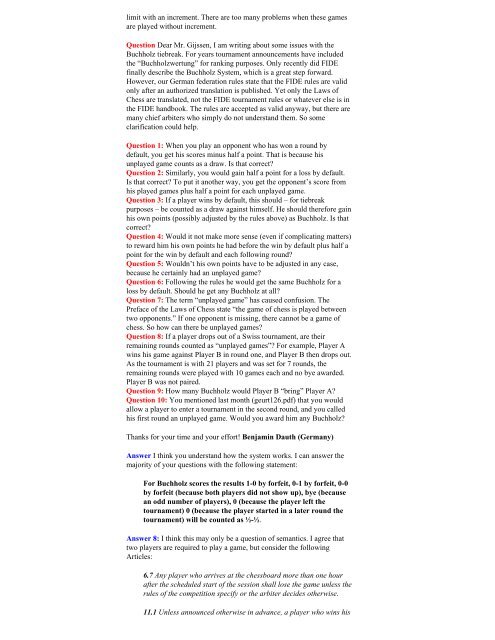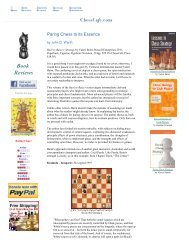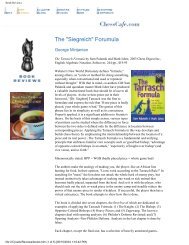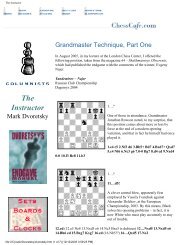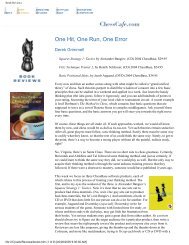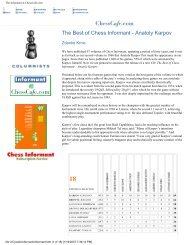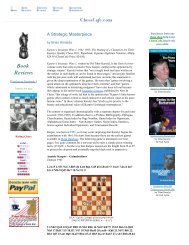You also want an ePaper? Increase the reach of your titles
YUMPU automatically turns print PDFs into web optimized ePapers that Google loves.
limit with an increment. There are too many problems when these games<br />
are played without increment.<br />
Question Dear Mr. Gijssen, I am writing about some issues with the<br />
Buchholz tiebreak. For years tournament announcements have included<br />
the “Buchholzwertung” for ranking purposes. Only recently did FIDE<br />
finally describe the Buchholz System, which is a great step forward.<br />
However, our German federation rules state that the FIDE rules are valid<br />
only after an authorized translation is published. Yet only the Laws of<br />
<strong>Chess</strong> are translated, not the FIDE tournament rules or whatever else is in<br />
the FIDE handbook. The rules are accepted as valid anyway, but there are<br />
many chief arbiters who simply do not understand them. So some<br />
clarification could help.<br />
Question 1: When you play an opponent who has won a round by<br />
default, you get his scores minus half a point. That is because his<br />
unplayed game counts as a draw. Is that correct?<br />
Question 2: Similarly, you would gain half a point for a loss by default.<br />
Is that correct? To put it another way, you get the opponent’s score from<br />
his played games plus half a point for each unplayed game.<br />
Question 3: If a player wins by default, this should – for tiebreak<br />
purposes – be counted as a draw against himself. He should therefore gain<br />
his own points (possibly adjusted by the rules above) as Buchholz. Is that<br />
correct?<br />
Question 4: Would it not make more sense (even if complicating matters)<br />
to reward him his own points he had before the win by default plus half a<br />
point for the win by default and each following round?<br />
Question 5: Wouldn’t his own points have to be adjusted in any case,<br />
because he certainly had an unplayed game?<br />
Question 6: Following the rules he would get the same Buchholz for a<br />
loss by default. Should he get any Buchholz at all?<br />
Question 7: The term “unplayed game” has caused confusion. The<br />
Preface of the Laws of <strong>Chess</strong> state “the game of chess is played between<br />
two opponents.” If one opponent is missing, there cannot be a game of<br />
chess. So how can there be unplayed games?<br />
Question 8: If a player drops out of a Swiss tournament, are their<br />
remaining rounds counted as “unplayed games”? For example, Player A<br />
wins his game against Player B in round one, and Player B then drops out.<br />
As the tournament is with 21 players and was set for 7 rounds, the<br />
remaining rounds were played with 10 games each and no bye awarded.<br />
Player B was not paired.<br />
Question 9: How many Buchholz would Player B “bring” Player A?<br />
Question 10: You mentioned last month (geurt126.pdf) that you would<br />
allow a player to enter a tournament in the second round, and you called<br />
his first round an unplayed game. Would you award him any Buchholz?<br />
Thanks for your time and your effort! Benjamin Dauth (Germany)<br />
<strong>An</strong>swer I think you understand how the system works. I can answer the<br />
majority of your questions with the following statement:<br />
For Buchholz scores the results 1-0 by forfeit, 0-1 by forfeit, 0-0<br />
by forfeit (because both players did not show up), bye (because<br />
an odd number of players), 0 (because the player left the<br />
tournament) 0 (because the player started in a later round the<br />
tournament) will be counted as ½-½.<br />
<strong>An</strong>swer 8: I think this may only be a question of semantics. I agree that<br />
two players are required to play a game, but consider the following<br />
Articles:<br />
6.7 <strong>An</strong>y player who arrives at the chessboard more than one hour<br />
after the scheduled start of the session shall lose the game unless the<br />
rules of the competition specify or the arbiter decides otherwise.<br />
11.1 Unless announced otherwise in advance, a player who wins his


